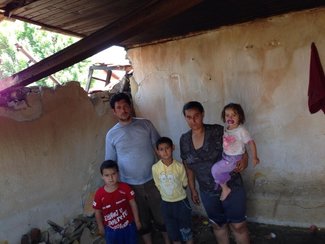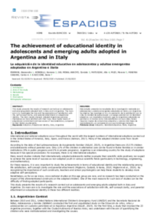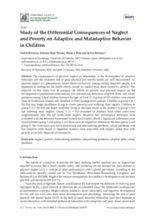

Displaying 131 - 140 of 545
This short video from BBC News features interviews with some of the migrant children and young people who are being held in difficult conditions in the Greek port of Mytilene.
The aims of this article were to identify the types and characteristics of social support for families in vulnerable situations and to analyze what elements influence families’ attitudes towards these supports.
This study presents the results of research carried out on adolescents and emerging adults adopted both in Italy and in Argentina. The main aim is to investigate the role and the associations of satisfaction with life, self-concept clarity, and parental attachment on educational identity.
In this study, autobiographical memory tests, working memory, and a depressive symptom assessment were administered to 48 adolescents in care with a history of maltreatment (22 abused and 26 neglected) without mental disorder, who had been removed from their family and were living in residential child care, and to 61 adolescents nonmaltreated who had never been placed in care.
This qualitative study, conducted in Portugal, aimed to understand professionals' perspectives on the collaborative processes between the Early Childhood Intervention (ECI) and the Child Protection Systems.
In this article, the authors explore how relationships in the workplace may be an important source of support for some care experienced young people.
Identifying different domains and dimensions of children’s well-being and touching upon its multifaceted nature, this study presents an alternative framework, showing how the quality of the reception path for unaccompanied minors is fundamental to having successful results throughout the entire integration process.
In respect of international migration by children and adolescents, the aims of this chapter are: (1) to present the main trends of migratory dynamics before and during the economic crisis in Spain, migrant children in the educational system, and their career expectations as they become adults; and (2) to analyse local policies towards reunified children in Madrid and Barcelona.
The objective of this study was to compare the effects of poverty and physical neglect on the development of problematic externalizing and internalizing behaviors, adaptive skills, and school problems among school children between the ages of 3 and 12.
For this study, a sample of 365 adolescents in residential care settings in Portugal completed a set of self-reported measures, specifically, the Rights perceptions scale, the Place attachment scale and Scales of psychological well-being.


